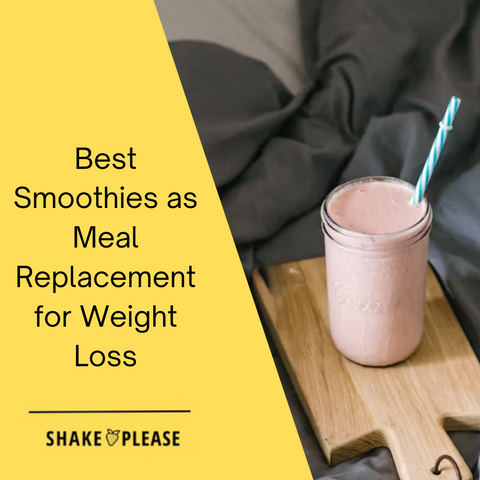
Introduction to Meal Replacements and Protein Shakes
Meal replacements, including meal replacement shakes and protein shakes, are popular tools for managing weight and supporting fitness goals, but they serve different purposes. Meal replacements—including shakes, bars, and powders—are designed to replace a meal while meeting specific nutritional standards. In contrast, protein shakes primarily supplement protein intake, often using protein powder as a key ingredient.
Understanding these differences is essential for selecting the right option based on your individual nutritional needs and dietary goals. Protein shakes usually come in powdered form and can be mixed with water, milk, or plant-based alternatives for convenience.
Both meal replacements and protein shakes offer unique benefits and potential drawbacks depending on your requirements. Meal replacements are typically used to replace one or two meals per day, providing balanced nutrition, while protein shakes are commonly consumed post-resistance training to support muscle recovery and growth. Various protein supplements and healthy foods re available to cater to different dietary preferences and needs.
Benefits of Meal Replacement Shakes
Meal replacement shakes offer a convenient and balanced nutrition option, especially for busy individuals. Here are their key benefits, including various health benefits :
-
Complete Nutrition: Provide the equivalent of a full meal, including essential amino acids, healthy fats, vitamins, minerals, fiber, and micronutrients.
-
Convenience: Available in various forms like shakes, bars, and powders, making meal replacement easy and quick.
-
Calorie Control: Help manage calorie intake by often containing fewer calories than traditional meals, supporting weight management and weight loss.
-
Support Weight Loss: Promote calorie deficits while preserving muscle mass, which is vital for overall health and body composition.
-
Portion Control: Aid in controlling portion sizes and simplifying daily meal planning.
-
Simplify Tracking: Make calorie counting easier for those monitoring their intake.
When using meal replacement shakes, it’s important to ensure you consume enough calories to meet your nutritional needs and avoid deficits.
Benefits of Protein Shakes
Protein shakes are a convenient and effective way to boost protein intake, especially for those focused on muscle growth and recovery. Key benefits include the provision to add not only protein to shakes:
-
High Protein Content: Provide a concentrated source of protein with minimal other macronutrients, ideal for muscle repair and rebuilding after exercise.
-
Support Muscle Synthesis: Help promote muscle protein synthesis and maintain lean muscle mass, particularly after resistance training.
-
Variety of Protein Sources: Available in forms made from whey, soy, or plant-based proteins to suit different dietary preferences.
-
Supplement, Not Replace: Designed to complement dietary protein needs rather than replace full meals.
-
Convenient Alternative: Offer an easy way to increase protein intake when whole food options are unavailable.
-
Popular Among Athletes: Favored by fitness enthusiasts and athletes for muscle gain and recovery support.
-
Part of Balanced Diet: Should be consumed alongside a balanced diet that includes other essential nutrients for overall health.
Protein shakes are a practical tool to help meet higher protein requirements and provide more protein, especially when combined with high protein foods, to support fitness and health goals.
Protein Shake vs Meal Replacement - Making the Healthiest Choice
Meal Replacements and Protein
Meal replacements and protein shakes can complement each other within a balanced nutrition plan. Here’s what to consider:
-
Different Roles: Meal replacements provide a complete meal, while protein shakes focus on supplementing protein intake.
-
Supplemental Nutrition: Supplemental nutrition drinks offer additional nutrients for those with specific health or dietary needs.
-
Combined Benefits: Using both can support muscle growth and weight management effectively.
-
Weight Management: Both can aid in weight loss and maintenance when chosen wisely.
-
Nutrient Density: Opt for products that are rich in nutrients and low in artificial ingredients.
-
Label Awareness: Carefully read labels to assess protein content, calorie count, and overall nutritional value.
Understanding these factors helps you select the right combination to meet your individual health and fitness goals.
Types of Meal Replacements and Protein Powders
Meal replacement and protein powders come in various forms to fit different dietary needs. Key options include:
-
Dairy-Based, Plant-Based, and Dairy-Free: Suitable for various dietary restrictions.
-
Plant-Based Proteins: Pea and rice protein offer nutritious alternatives to dairy-based powders.
-
Fortified with Nutrients: Many are enriched with vitamins and minerals for overall health.
-
Meet Nutritional Guidelines: Formulated according to standards from WHO and EFSA.
-
Whole Food Ingredients: Choose products with natural ingredients and minimal artificial additives.
These choices help you find the right nutrition for your lifestyle.
How to Choose a Meal Replacement Shake
When selecting a meal replacement shake, keep these factors in mind:
-
Protein Content, Calories, and Nutrition: Ensure the shake provides a balanced, complete meal with adequate protein and calories.
-
Nutrient Density: Choose products rich in essential nutrients and low in artificial ingredients.
-
Portion Control: Consider how the shake fits into your daily meal plan and supports portion management.
-
Meal Replacement Use: Ideal for replacing one or two meals per day, especially for busy lifestyles.
-
Personal Goals: Tailor your choice to your specific needs, whether for weight loss, muscle gain, or general nutrition.
Selecting the right meal replacement shake helps you maintain balanced nutrition conveniently.
How to Choose a Protein Shake
Selecting the right protein shake depends on your fitness goals and dietary needs:
-
Muscle Building: Choose shakes with high protein content and a complete amino acid profile to support muscle repair and growth.
-
Weight Management: Opt for meal replacement shakes that combine protein with healthy fats and complex carbs to keep you full and nourished.
-
Check Ingredients: Always read labels to avoid artificial additives and ensure the shake fits your nutritional requirements.
-
Protein Source: Whey and casein are high-quality options, while plant-based proteins like pea or rice are great for dairy sensitivities or plant-based diets.
Shake Please Protein Smoothies
For a convenient, high-quality option, consider Shake Please protein smoothies. Each contains 25 grams of whey protein combined with nutrient-rich fruits and superfoods, perfect for muscle support and weight management.
Popular flavors include:
Matching your protein shake to your goals ensures you get the most from your nutrition.
Using Meal Replacements for Weight Loss
Meal replacement shakes can be an effective tool to promote weight loss, helping you to lose weight by offering controlled calorie intake and portion control through a complete meal. Key benefits include:
-
Calorie Deficit: Help create the calorie deficit necessary for weight loss.
-
Muscle Support: Support muscle mass maintenance, which is vital for overall health and body composition.
-
Weight Management: Useful for both losing weight and maintaining weight loss over time.
-
Versatility: Some formulations also support weight gain for those with different nutritional needs.
-
Complementary Approach: Best results come from combining meal replacements with a healthy diet and regular exercise.
Incorporating meal replacement shakes thoughtfully can support your weight management goals, effectively and sustainably.
Using Protein Shakes for Muscle Growth
Protein shakes offer a convenient way to enhance muscle growth, especially when combined with resistance training. After exercise, your muscles require essential amino acids from protein drinks to trigger muscle protein synthesis, which is vital for repair and development. Consuming a protein shake with 15-30 grams of protein within 30-60 minutes post-workout helps maximize this process, promoting faster recovery and muscle gains.
Beyond post-workout use, protein shakes can be consumed throughout the day to supplement your diet and ensure you meet your daily protein needs. However, it’s important to remember that protein shakes should complement, not replace, whole foods to ensure you get enough protein . Whole foods provide additional nutrients and fiber essential for overall health, so using protein shakes as part of a balanced diet supports both muscle growth and general well-being.
Common Mistakes to Avoid
When adding meal replacement or protein shakes to your routine, it’s important to steer clear of common mistakes to maximize their benefits:
-
Overreliance on Shakes: Relying too heavily on shakes while neglecting whole foods can lead to missing out on essential nutrients, fiber, and satiety.
-
Ignoring Labels: Not reading nutrition labels carefully may result in consuming excess calories, added sugars, or artificial ingredients that can hinder your health or weight loss goals.
-
Poor Portion Control: Drinking more than the recommended amount can add unwanted calories and slow your progress.
-
Neglecting Hydration: Both types of shakes can be dehydrating, so it’s crucial to drink enough water alongside them.
By avoiding these pitfalls, you can effectively incorporate shakes into a balanced, healthy diet.
Discover the Power of Protein Meal Replacement Shakes
Incorporating Meal Replacements and Protein Shakes into Your Diet
Adding meal replacement products and protein shakes to your daily routine can effectively support your fitness goals, whether for weight loss or muscle growth. For weight loss, replacing one or two meals with a meal replacement shake helps control calorie intake while still delivering essential nutrients. Protein shakes serve as a convenient supplement, especially post-workout or when additional protein is needed to promote muscle growth.
However, it’s crucial to maintain a balanced diet rich in nutrient dense whole foods like fruits, vegetables, whole grains, lean proteins, and healthy fats. This ensures you receive a full spectrum of vitamins and minerals, nutrients, fiber, and satiety necessary for overall health and sustainable results. By thoughtfully integrating meal replacements and protein shakes alongside whole foods, you can better achieve your fitness goals and support a healthy lifestyle.
Conclusion
Meal replacement shakes and protein shakes are valuable tools to support your fitness goals, whether focused on weight loss, muscle growth, or overall health. Choosing the right shake for your needs, reading labels carefully, and avoiding common pitfalls like neglecting whole foods or overeating are essential. A balanced diet rich in fruits, vegetables, whole grains, lean proteins, protein foods and healthy fats provides the foundation for lasting health and success. By incorporating these shakes thoughtfully and mindfully, you can meet your nutritional needs and achieve your fitness objectives. For personalized guidance, consult a healthcare professional or registered dietitian to tailor your approach to your unique dietary and fitness goals.





